Adventure Girl learns why sometimes it’s okay to need help
‘You dissociate too easily. I need you to keep one foot in the present when you recount your past.’
At the time my cancer was discovered, and during my subsequent treatment, people were surprised at how well I ‘coped’.
It’s not the first time I have surprised people in this way. When my partner of ten years up and left several years back, people commented on how ‘well’ I was doing. I guess in contrast to my day-to-day extraverted emotion — the heart I wear on my sleeve — I would have appeared calm, ‘together’.
The reality is that I struggle with needing people. I want to feel independent and strong, so when faced with really big stuff, I ‘cope’.
Except when coping, what I am actually doing is dissociating. I push the pain away — somewhere — but not where I am, not in the present moment. I step away from my emotions and my rational brain kicks in and takes over. My responses are calm because they are detached.
This means when people offer me support, in that moment, I shrug it off. There is nothing there for them to support me through, because I am not in touch with those emotions, that need — even that I have a need. At least, not right then.
This dissociation manifests in different ways. In times of crisis, it allows me to detach and simply focus on whatever tasks are in front of me. When someone hurts me, it allows me to push the hurt aside and deal with the situation coldly and rationally, and hide that hurt from them. It also means when I recall a memory, or evoke a fictional scene, I step out of the present and into the moment as though it were happening right in front of me.
My dissociation helps me to write, because I can recreate moments, and it helps me to cope because I can step away from intense emotions, but it means I don’t always process things in the here and now, or even soon after, when I probably should. Instead I carry the pain around with me until it feels safe to let it out.
For the most part it serves me well. It allows me to get on with the task at hand, and I process things eventually. Earlier this year, however, it got me into trouble. My cancer treatment was over, and I should have been settling back into regular life, but I wasn’t. I felt stuck. Trapped. I was at the bottom of a steep pit with no rope or foothold to climb out. At the same time, some of my friendships came to an end. One friend told me she was disappointed that I ‘couldn’t put my issues aside for her birthday’. My ‘issues’ were later diagnosed as post-traumatic stress.
From what I understand (and this is my layman’s explanation — a professional can probably correct me) risk factors for developing post-traumatic stress include not having a support network at the time of the event, or ‘trauma’, and not being able to recount your story. People who have faced a trauma need to tell their story over and over, in excruciating detail and in a supported environment, to help normalise the experience and to help detach, so that it becomes an ordinary memory to be processed and stored. It is the reason psychologists recommend narrative therapy and support groups for people who have undergone traumatic experiences.
Memories of unprocessed trauma can surface unexpectedly, intrusively. You feel afraid for no apparent reason, irritable, emotional. You avoid certain places, certain objects, things that might remind you of the unprocessed event. You might experience a loss of control, and compensate by trying to control everything else. Anything that represents a further loss can be irrationally terrifying or infuriating.
Although my cancer scare wasn’t actually life-threatening (the lump was removed, the area was treated, and I now face no more than an increased risk of another cancer in the future), in the moment, hearing the words, knowing what could be, I dissociated. All I could focus on was reassuring others, especially my mum, whose friend had died of breast cancer when she was the same age as me. I was alone when they told me, because I wasn’t expecting the scan to be anything sinister. I don’t have a family history or any reason to consider breast cancer a risk. I thought the lump was going to be some sort of blocked duct or cyst, nothing more.
‘Do you need us to call someone?’ they had asked. ‘No. No, I don’t need anyone.’
The surgeon didn’t mention the C-word. It was ‘DCIS’ or ‘pre-cancer’. I’ve had pre-cancerous cells on my cervix, and they were removed with no further treatment required. Why was this different?
Yet I was booked in for surgery within days and medical staff were handing me books about ‘early breast cancer’. Apparently this was different to cervical dysplasia. Breast cancer behaves differently, is more aggressive and difficult to treat — at least, that’s what I pieced together while everyone was avoiding naming what the lump really was. Never mind that I might lose my breast or what I might feel about my body after all this.
It was only later, when I sat looking at the books and saw the figures — survival rates calculated over the next five years (I would be 40) — that it really hit me.
Except it didn’t. Not fully. I was looking at the crows-feet-eyes of the middle-aged women on the booklet covers, and the thirty-something mothers and hearing ‘DCIS’. I had nothing in common with them.
In the same week a house-mate announced she wanted to move out, I had attended the Victorian Civil and Administrative Tribunal (VCAT) to sort out a dispute with my tenants, my boss (the only person left who I could trust in my workplace) had resigned, and my partner’s dad was visiting, with various family trips planned. Then my friend (the one whose birthday I wasn’t able to give my all to a few months later) announced she wanted to leave her husband. She was the same age I had been when my husband and I separated, and I became her main support person. Even if I had wanted to process what was happening to me, I didn’t really have time.
And it’s not that I didn’t have a support network. People were there for me in the next few weeks. So many people. I accepted visits gratefully. I made jokes and spoke in a detached way about what was happening to me physically, but I didn’t really talk about my fear. Instead of letting them help me, I put on my ‘there are people here to attend to’ façade and coped. At my insistence I walked to surgery by myself, I took care of as much as possible, and I was there for my friends when they needed it.
During the following weeks I noticed a strange heart murmur that kept cropping up. An irregular beat, like a frantic thud, followed by shortness of breath. Investigation showed nothing more sinister than a stress-induced misfiring valve, a benign abnormality that had probably always been there, triggered by the emotions I wasn’t processing.
During the following months I went from one physical side-effect of treatment to another, always focusing on my body, never on what was happening in my mind. From a post-surgery infection to a seroma, from cording to lymphedema, followed by knee and hip misalignment where my body was trying to compensate for everything going on up top. Next was the chronic constipation and blocked bowel that had taken me to the GP in the first place, and I finally got around to a colonoscopy and follow-up Pap test — monitoring the other pre-cancers discovered in my body.
I was so busy focusing on what was happening physically that I ignored what was going on in my mind.
My brain wasn’t going to let it pass, however. If I wasn’t ready to face the emotions, it would instead send my body to sleep. I was sleeping for twelve, sometimes fourteen hours a day, and it still wasn’t enough. This made getting on with things difficult, and ultimately upped my stress as deadlines slipped away.
Then my inability to stay awake began to alternate with hyper-vigilance and an inability to get to sleep. I lay awake, paranoid and fearful, my mind switching from deathly quiet to a cacophony. I began to dream, not about the cancer, but about my abusive ex. On several occasions I woke believing he was in the house, that he was stalking me. A trick of the light could make everything flicker and change until I was in his room and my partner was him, looking at me through those same deadened eyes.
I was terrified of everyone and everything, and nobody understood. I felt completely immobilised inside my own life. Hopeless and helpless.
I could no longer distinguish childhood me from the person I am now. I had no mechanism to escape the shame of everything I have ever been and loathed: jealous, insecure, manipulative, weak, helpless, angry. The anger inside me was at times so frightening, and I couldn’t switch it off. Occasionally it leaked out, unexpectedly, and completely misdirected. Then I felt more shame for having lost control so inappropriately. Most of all I wanted to stop being a burden on the people around me, especially my partner, who had to put up with my crazy.
I felt guilty for falling apart when I was okay, I wasn’t dying, and there are people so much worse off than me. I found out an old boss had been diagnosed with cancer at around the same time as me. She had to have her breast removed and underwent chemotherapy. And my childhood next door neighbour was diagnosed with bowel cancer. She passed away last month. I had and have no right to these emotions, and so I tried to fight them, but it only made them worse.
All of this was swirling through my brain, and I couldn’t tell any more what was past and what was present. I was re-experiencing emotions that were long gone, and beating myself up for them.
My partner got me in to see a doctor when it became apparent I couldn’t even manage that, and I had to take a chunk of time off work. But even then another good friend was going through a long-term relationship break-up and I was trying to be there for her. I had study to complete and articles to write. I was looking for jobs and a place to live interstate, and all I wanted was to find somewhere safe where I could hold the child inside me and cry.
Meanwhile a very good friend found me a trauma counsellor, someone who specialises in cancer patients. The GP and then my therapist explained why I was feeling this way and helped normalise the experience for me. Reassured that I wasn’t going crazy, I felt more in control. The therapist gave me articles to read on trauma and coping techniques, and taught me to lock my memories away until I have the skills and mechanisms to cope with processing them. This we would do in a controlled environment to avoid triggering my flashbacks. I learned that one trauma can trigger another, which is why the loss of control over my cancer triggered the unprocessed trauma of the abusive relationship.
I got to a point where I was able to ‘cope’ once more. The depression and anxiety were manageable, and the flashbacks had mostly stopped. I no longer needed to control every little thing, feeling fearful and irritable. I went back to work and got on with my study, and I put off the move and job hunt, taking away as many added pressures as I could.
Eventually I had to stop my therapy. I ran out of Medicare visits and my counsellor told me I can’t process the trauma until I learn to stop dissociating. We tried processing some things, but whenever we evoked a memory, just as I step out of a present moment in order to cope, my brain stepped out of the present and into the past, re-experiencing as though it were happening all over again. Even as I type, I can barely see the screen through my tears: recounting my story feels as real as if I were there now.
So where does this leave me? My unprocessed trauma remains in a hypothetical box. I have some new skills to help keep me grounded, and some others to help with my anxiety.
My next task is to learn how to stop reliving the past, to stop beating myself up and evoking the shame of who I have been — and I’m talking about the person I was as a child and a teenager, who had diffuse boundaries and an over-abundance of uncontrolled emotions. I have to remind myself that I am not her any more, and any time I see someone displaying similar behaviours, it’s not me.
But perhaps that’s not it at all. Maybe the real task is to learn to accept and forgive that part of me. Because although I am not that person now (as an adult I have learned more appropriate behaviours and responses and I can see the many shades of grey), she has been me. I have been her.
Perhaps when I slip into the past, I can instead ask the child-me what she feels, listen to her story in detail, and give her the support to quiet her anger and her fears. Maybe if I allow her to accept support from me, she will learn that it doesn’t make her weak, that she won’t lose herself because of it, and we can both learn to recognise our emotions in the moment, to know when we need help, and not be frightened to accept it when it’s offered.
–A.G.


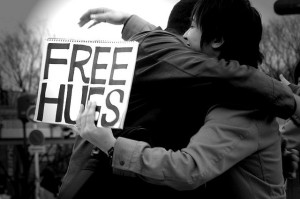
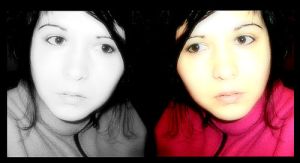
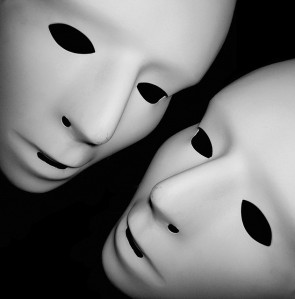
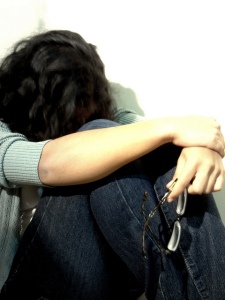
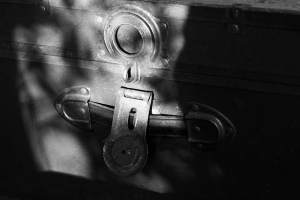


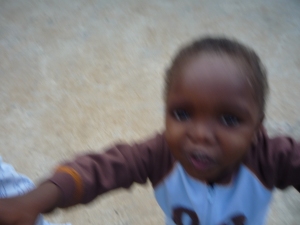
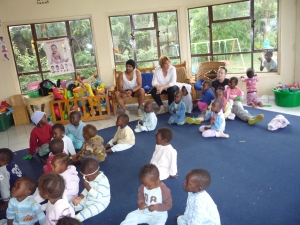
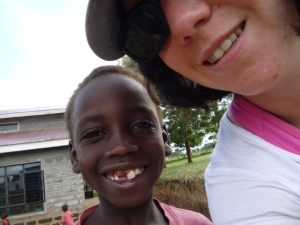
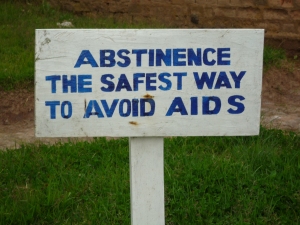
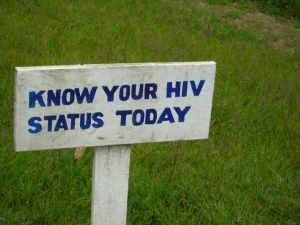
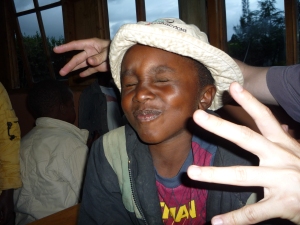

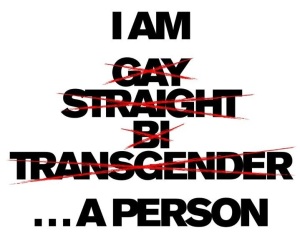

My fear
Adventure Girl learns the true cost of being afraid
Source: Fernando Rodríguez
My father was an intimidating man who ruled by fear. Asking for help meant causing trouble, but not asking and messing things up was far worse. From this I learnt that unless I was certain I could get something right (or that I could quietly correct what went wrong), it was safer not to try.
Meanwhile my mother taught me and my sisters not to attempt things that might be dangerous, not to venture too far, and to always walk the same way so she could find us if we strayed. Perhaps she feared losing control of us in case she, too, incurred my father’s ire.
In my mid-thirties I find I am still afraid to explore, to step outside the limits of what I know, and strike a new path. What if I mess up? What if I get into trouble? If I get lost, who will find me?
At times my fear is crippling. I struggle to make big decisions, such as what career to pursue, in what part of the world to live, even what kind of person to be. With no path carved out for me, I don’t know how to get there, or if I’ll be any good once I do. What if I make a mistake?
In my day-to-day, when faced with a new task or challenge, instead of accepting it is okay not to know how to do something, that making the occasional blunder is perfectly all right, I shrink into a knotted ball of anxiety.
The only thing greater than my fear of messing up, is my fear of missing a deadline. While in my anxious ball, I procrastinate, avoiding the task itself, instead searching for an answer, hoping it will click in my brain and I won’t have to ask for help. Eventually I am cornered, forced to start or miss my deadline, with no time to second guess whether I might make a mistake, or to worry about the quality of what I produce.
For the most part I manage to work things out, but the time in between is excruciating. I feel like a failure, a fraud, and a fool.
My feelings of inadequacy are compounded when I encounter people for whom life, tasks, and choices, are simple. What could I possibly find so hard? An attitude, a demeanour, a phrase, can send me back into the mind of seven-year-old me. Lost, frightened and dismissed as stupid or bothersome. I feel as though I can’t ask for help, that I need to work it out on my own, and if I make a mistake I am certain to bring down some cataclysmic eruption. People will know I am a fake and see the useless little girl I hide beneath.
People tell me this is ridiculous. To them I appear strong, intelligent and capable. They don’t see what goes on inside my head, the things I won’t even try.
From the outside, I appear to have a home, a partner, a successful career, but it is not a path I would have chosen.
Growing up I wanted to be a writer, but writing was not a safe career, so my passion was relegated to a hobby. If I am honest, this was with some relief. I never had to put my ability to the test.
My next choice was to become a teacher, to be immersed in learning, and teaching English and Literature, I could continue to write. But when my then boyfriend sat me down and said, ‘You’re too emotional, the kids will walk all over you,’ I knew he was right. The hidden child-me could never face a room full of adolescents. Academia was just as daunting, more so because there was no clear path to follow.
In the end I enrolled in science. I saw a world of ideas and theories and hoped to combine what I learned with writing to make science more accessible. But the leap from high school to university was too great. Stuffed into giant lecture theatres, I was surrounded by strangers who all seemed to know what was going on, while I floundered, and the three-hour practicals were like taking twice-weekly exams of what I do worst: using my hands, not my words.
I didn’t want to cause trouble and I had nowhere to turn. I was too afraid to ask for help, to admit I was lost. For the first time in my life I tried something I expected to do well at and failed.
My self-perception plummeted. I didn’t know how to pull myself out, to re-frame my less-than-perfect outcome and learn from it, so I switched paths altogether.
Out of university I took the first grown-up job that came my way, unrelated to my studies, or any of my interests, but it was safe and it paid the bills. For years I didn’t write, didn’t learn, I just worked, climbing the ladder that was in front of me because it was there and because I needed to feel like I was achieving something. I was completely hollow inside.
From there I side-stepped into a job more suited to my abilities, where I could actually use my analytical brain, but it was not the path I would have chosen. Eventually I enrolled in professional writing and finished a Masters alongside my day job, one slow subject at a time.
For eight or nine years now, I have studied alongside my work, stealing snatches of time around the edges of my life to write, to pursue my true interests, to try to work out what I want to do and how to get there. I try to also maintain my fitness, my social life, and my various obligations, yet I always feel the pull of what I’m not getting done.
It has been a long time since I simply took a stroll, meandering just to see what there is to see, without feeling guilty, or the urgency of my eternal to-do list. I lust for the time to simply read a book, to not feel rushed and pressured to get the next task done. Yet fear keeps me clinging to the familiar path while I try to chip away at something new.
Last year I finally allowed myself to entertain an entirely new career, the study of sexuality, relationships and human behaviour. I have always wanted to understand why we do the things we do, how we relate to one another and how this impacts on our sexuality. I knew that leaping, rather than stepping, off my familiar path, was the only real way to prevent me clinging to safety, so I had planned to resign my job, move interstate, enrol in this new discipline and establish a whole other career.
At the time it felt liberating. I was following a path that I had actively chosen. But then my partner wasn’t able to take the leap with me, at least, not when I needed to. A job offer fell through, and the course I had enrolled in turned out to be another source of anxious unknown. Not a distinct path to a concrete career, but specialist knowledge to build upon a career foundation that I don’t have, and one that will take years of study to acquire. I just don’t have the resources or the energy left in me.
So here I am in my home town, still at the same job, taking one subject at a time, and trying to slowly and painstakingly carve a new path alongside the one I fell into. I am exhausted.
I wonder how different my life would be if I had been encouraged to explore, to cross boundaries, to exceed limits. If I was allowed to take things apart, just to see how they worked inside, with no fear of reprisal if they couldn’t be pieced back together. If asking for help had been rewarded, rather than punished and being less than perfect had been okay. Instead I feel trapped inside my own life, by its security, by my fear of taking a new path and making a mistake.
Possibly the only thing more terrifying than taking the leap is what will happen if I don’t. Am I using my procrastination tactic once more, but with my entire life? Will the pressure build and build until I have no choice but to take the leap and scrounge for a new path?
I can see the warped logic, but it is flawed. I know myself better than that. Left to free-fall I am likely to take the nearest and safest path, the one that is most familiar, not the one I truly want to follow.
And that’s the real toll of this fear. Not the turmoil, the tears, the sleepless nights, the sheer exhaustion and terror of getting something wrong. It’s the opportunities I miss. The paths I don’t take. The life I have been too afraid to live, and the person I have been too frightened to embrace.
–AG
Share this: